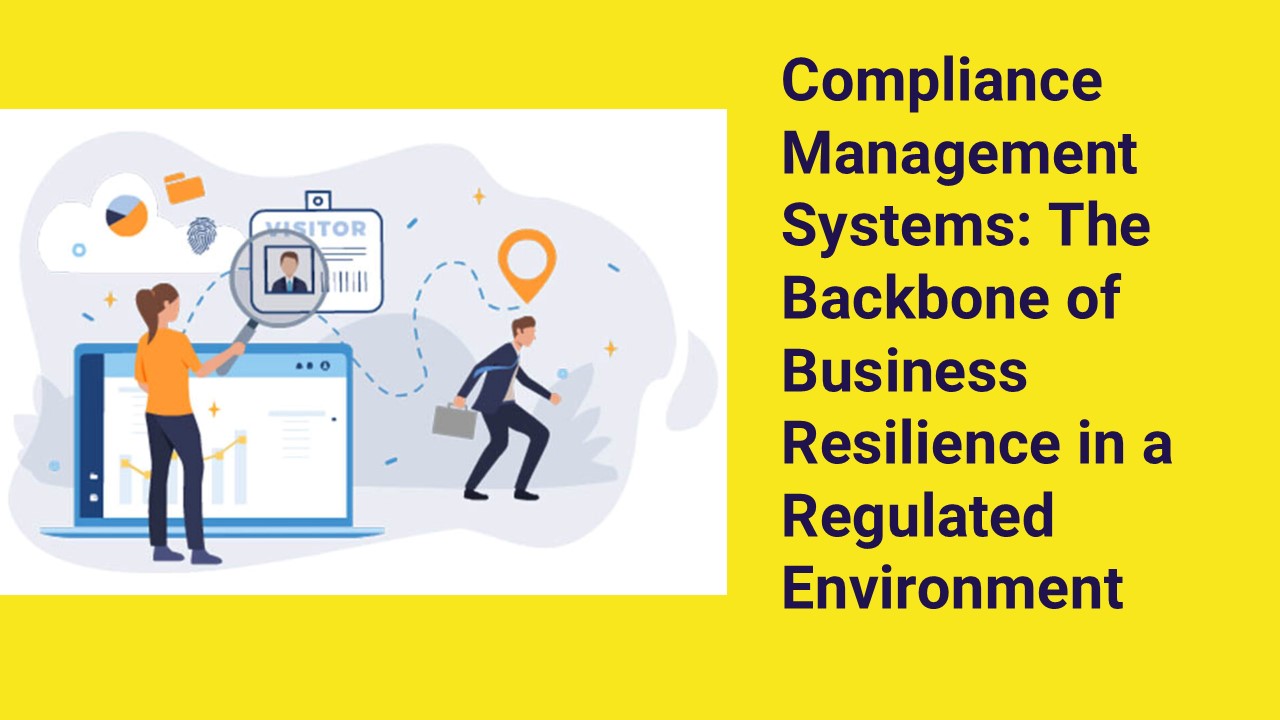Compliance Management Systems: The Backbone of Business Resilience in a Regulated Environment
Title: Compliance Management Systems: The Backbone of Business Resilience in a Regulated Environment
1
Compliance Management Systems The Backbone of
Business Resilience in a Regulated Environment
2
Compliance Management Systems The Backbone of
Business Resilience in a Regulated
Environment
In todays fast-paced business world, regulatory
requirements are constantly evolving. Picture a
thriving organization suddenly facing a shift in
ESG standards or new data privacy laws, demanding
an immediate response. Compliance is no longer
about avoiding finesit is about fostering trust,
maintaining agility, and ensuring sustainable
growth. A Compliance Management System (CMS) is
the cornerstone of proactive compliance,
embedding regulatory adherence into an
organizations core operations. Companies that
leverage compliance as a strategic advantage,
rather than a regulatory burden, stand out in
competitive and highly regulated industries.
3
How Compliance Strengthens Business Resilience A
well-structured Compliance Management System
empowers organizations to navigate regulatory
challenges and maintain operational stability
through Mitigating Risks A CMS continuously
monitors regulatory updates, enabling businesses
to detect potential risks before they escalate.
Proactive compliance management prevents legal
disputes and protects financial
stability. Ensuring Operational Continuity
Through automated workflows, a CMS helps
businesses meet deadlines and avoid audit
failures or penalties. Automation reduces the
risk of human error and maintains consistent
regulatory adherence.
4
Protecting Reputation
Proactive compliance fosters trust among
stakeholders, including investors, customers, and
partners. A strong commitment to compliance
boosts market credibility and reinforces business
ethics.
By adopting a Compliance Management platform,
companies not only safeguard themselves from
regulatory violations but also build a robust
foundation for sustained success and
accountability.
5
The Transformation of Compliance Management
Systems The evolution from traditional
compliance methods to modern systems has
redefined how organizations approach compliance
management AI-Driven Insights Modern
Compliance Management Systems use artificial
intelligence and predictive analytics to identify
regulatory trends and help businesses prepare for
upcoming changes. Collaborative Compliance
Frameworks A CMS unites teams across legal, HR,
IT, and operations, creating a shared compliance
culture that breaks down organizational
silos. Scalable Operations With a flexible CMS,
businesses can extend their compliance frameworks
across different regions without major system
overhauls.
6
Three Ways a CMS Prepares Businesses for the
Future
Adapting to Change With regulatory environments
evolving quickly, a CMS helps organizations
respond swiftly, such as adjusting to new
workplace safety laws after global events.
Informed Decision-Making A CMS offers
data-driven insights, highlighting compliance
gaps and enabling leaders to take corrective
actions promptly.
Supporting Expansion Efforts Entering new
markets becomes smoother with a CMS that
streamlines regulatory adherence from the start.
7
Embedding a Compliance Management System into
business strategy not only protects organizations
from regulatory issues but also opens doors for
growth and innovation. The Hidden Returns of a
Compliance Management System Beyond compliance
cost savings, a CMS delivers additional
value Market Advantage Businesses with strong
compliance practices, such as ESG adherence,
attract investors and gain a competitive
edge. Empowered Workforce Automation reduces
manual workload, allowing employees to focus on
strategic initiatives. Innovation Opportunities
With reduced administrative overhead, businesses
can concentrate on innovation without fearing
regulatory obstacles.
8
A Compliance Management tool is more than a tool
for complianceit is an investment in operational
efficiency and sustainable growth. Choosing the
Right Compliance Management System When selecting
a CMS, businesses should consider the following
factors Real-Time Regulatory Monitoring A
reliable CMS should provide automatic updates and
alerts on regulatory changes.
9
Seamless Integration Compatibility with existing
systems, such as HR and ERP platforms, enhances
efficiency.
Mobile Accessibility A mobile-friendly CMS
allows compliance tracking from any location.
Customization Options Tailored features help
businesses meet industry-specific compliance
needs
A well-chosen Compliance Management System drives
long-term efficiency and regulatory success.
10
A Compliance Management platform is not merely a
safeguard against regulatory penalties it is a
catalyst for business resilience and growth.
Organizations that integrate compliance into
their strategic vision navigate regulatory
complexities with confidence and agility. In a
world of evolving regulations, a Compliance
Management solution becomes a blueprint for
successempowering businesses to thrive amidst
change, optimize their operations, and build a
future-ready enterprise.

